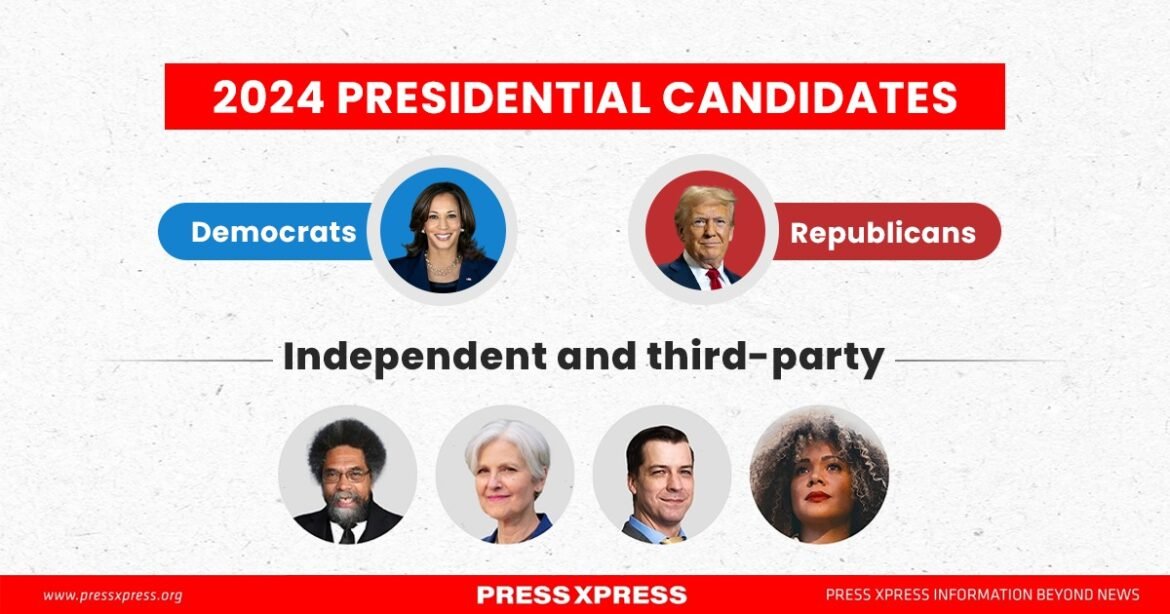- Theodore Roosevelt’s 1912 run is the highest-ever finish for a third-party candidate.
- Third-party votes in Florida affected the 2000 election outcome, giving George W. Bush a win.
- Polling shows third parties capture about 1% in the 2024 U.S. presidential race.
- Third-party presence pressures major candidates to address neglected voter priorities.
As the 2024 U.S. presidential race between Democrat Kamala Harris and Republican Donald Trump narrows, the role of third-party candidates is under renewed scrutiny. With many voters disillusioned by the main candidates’ positions, the question of whether to support a third-party contender has gained traction. This year, prominent third-party names like Green Party’s Jill Stein and Libertarian Chase Oliver offer alternatives, particularly for voters displeased with the major parties’ handling of issues from domestic policy to global conflicts. In an era where razor-thin margins decide election outcomes, a seemingly small fraction of third-party votes could have profound consequences.
The Influence of Third-Party Candidates
Third-party candidates have long been influential in U.S. politics, often shaping public discourse and pressuring the dominant parties to address overlooked issues. One of the most notable third-party campaigns was led by Theodore Roosevelt in 1912. As a former president, he formed the Progressive Party after failing to secure the Republican nomination. His campaign garnered 27% of the popular vote, placing him second, though he ultimately lost to Democrat Woodrow Wilson. More recently, in 1992, billionaire H. Ross Perot’s Reform Party candidacy attracted 19% of the popular vote, tapping into a widespread sentiment against economic mismanagement and governmental inefficiency, though he secured no electoral votes.
These examples demonstrate that while third-party candidates rarely achieve victory, they can draw attention to specific issues that resonate with portions of the electorate.
Third-Party Voting in Close Contests
As in previous U.S. elections, the 2024 race is likely to hinge on a handful of swing states. These states, including Michigan, Pennsylvania, and Wisconsin, are historically close races where small shifts in voter support can alter the outcome.
In 2024, polling indicates that while third-party candidates like Stein and Oliver are attracting lower support than in previous cycles, their presence remains significant in swing states. The Green Party’s platform, which addresses issues such as climate change, social justice, and foreign policy, appeals to progressive voters disillusioned by the Democratic response to issues like the Israel-Gaza conflict. Similarly, Libertarian support, though small, might impact Trump’s standing, especially among conservatives favoring limited government and fiscal responsibility.
Why People Choose Third-Party Candidates
Voter support for third-party candidates typically arises from two main motivations: ideological alignment and dissatisfaction with the two-party system. Many third-party supporters feel that the Republicans and Democrats are overly focused on corporate interests, often sidelining crucial issues such as healthcare reform, foreign policy changes, and economic inequality. A sizable portion of the American electorate believes the system is skewed toward wealthy elites and Wall Street, with policies that fail to address working-class concerns.
In 2024, issues surrounding international relations, particularly the U.S. response to Israel and Palestine, are particularly divisive. Progressive voters dissatisfied with the major parties’ stance may feel represented by Jill Stein of the Green Party or Cornel West, who have criticized the current administration’s handling of the crisis. Libertarian candidate Chase Oliver appeals to conservatives who feel Trump has deviated from traditional Republican values, especially on limited government and debt reduction.
Arjun Vishwanath, Political analyst and assistant professor in the political science department at Boston University, notes that these ideological divides highlight the gaps left unaddressed by the main parties.
Is Third-Party Voting Futile?
The “wasted vote” argument is a common refrain in American elections, positing that third-party votes have little real impact. According to proponents of this view, the two-party system and the electoral college structure make it virtually impossible for third-party candidates to secure victory, leaving their votes ineffective in the final outcome. Political historian Bruce Schulman argues that this perception shapes voter behavior, discouraging third-party voting due to the perceived futility of the outcome.
However, others believe that voting third-party is a form of political expression that transcends the electoral outcome. Voters who feel deeply aligned with a third-party candidate see their vote as a statement of values, not a strategic calculation. In a less competitive state, such as California, where the Democratic candidate is likely to win decisively, third-party voters might view their ballot as a symbolic gesture without fear of impacting the overall result. In swing states, however, the stakes are different, as a bloc of third-party votes could lead to the election of a candidate who does not align with those voters’ broader preferences.
The Long-Term Impact of Third-Party Voting
The rise of third-party support signals a deeper challenge within American democracy: a growing divide between voters and the two-party establishment. Analysts suggest that if disillusionment with the traditional parties persists, third-party candidates could continue to shape U.S. politics by spotlighting neglected issues. For instance, the Green Party’s focus on climate change has gradually pushed the Democratic Party to take stronger environmental stances, despite their differences in approach. As demographic shifts and ideological divisions evolve, the influence of third parties may become increasingly pronounced.
Third-Party Voting as an Agent of Political Accountability
Though third-party candidates face near-impossible odds in the U.S. electoral system, their presence remains a critical component of American democracy. Third-party voting allows citizens to voice discontent and advocate for overlooked issues, subtly pressuring the dominant parties to reconsider their stances. Whether viewed as an effective tool or a symbolic gesture, third-party voting reflects the demand for greater representation in U.S. politics. As the 2024 election unfolds, third-party candidates will likely remind major parties of the values held by diverse voter segments, reinforcing the importance of accountability in a complex and evolving political landscape.


